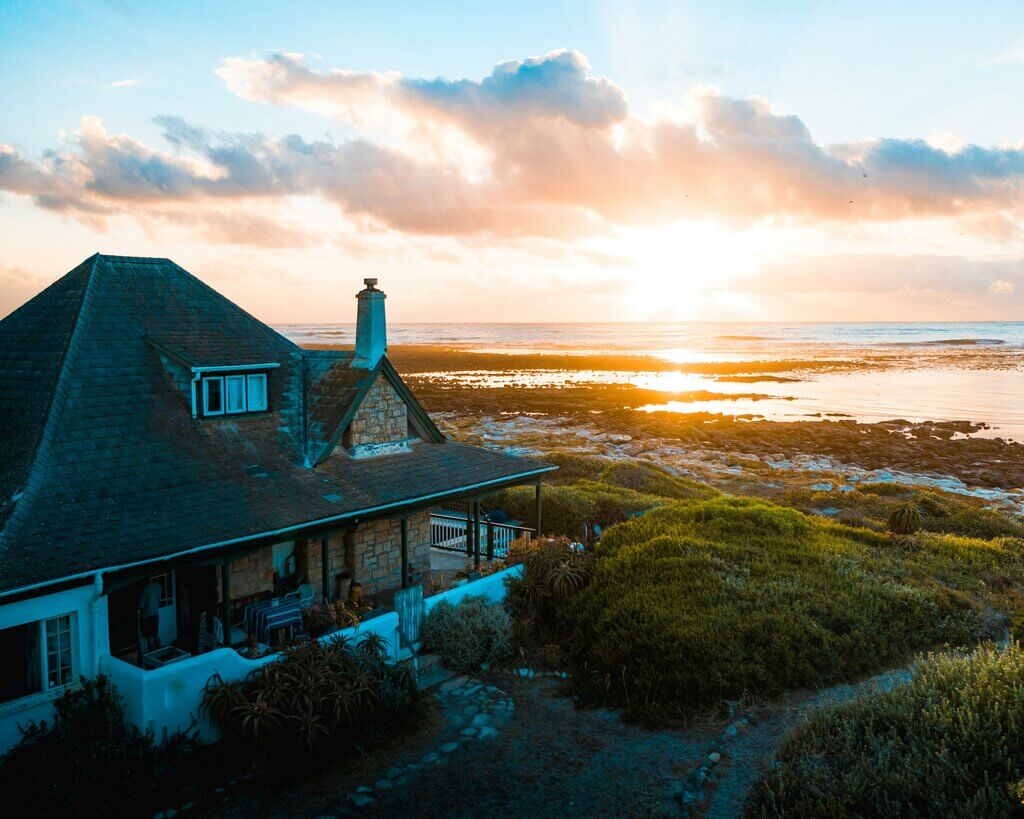Can foreigners buy property in South Africa?
Foreigners can buy a house in South Africa and rent it out, including residential and commercial properties. Buying a house in South Africa is generally straightforward without any major restrictions. Property ownership rights are similar to those of South African citizens, making South Africa an attractive destination for investors and homebuyers.
However, there is an exception for agricultural land; foreigners have limited foreign ownership of agricultural land as the government has implemented a leasehold system rather than a freehold for foreigners.
What are the benefits of buying a house in South Africa?
Buying a house in South Africa offers several benefits:
- Investment potential: The housing market in South Africa has been steadily growing, and is expected to grow 10.49% yearly till 2029. Properties in popular destinations consistently appreciate over time. This makes it a lucrative investment option.
- Diverse property market: There is a wide range of properties available to suit everyone’s needs and preferences.
- Favorable exchange rates: Foreigners from countries with stronger currencies can take advantage of favorable exchange rates when purchasing property in South Africa. This allows them to buy larger or more high-end properties than they might be able to afford in their home countries.
- Tourist destination: South Africa is a popular tourist destination, and the number of tourists visiting the country is expected to grow. This presents opportunities for property rental income.
- Quality of life: South Africa is known for its beautiful natural landscapes, warm climate, and overall quality of life.
How to buy a house in South Africa in 8 steps
The following 8 steps are included in the process of buying a house in South Africa:
Step 1: Research the property market
Determine what type of property you’re interested in, which area you prefer, and establish your maximum budget. If a mortgage is needed, foreigners must have a mortgage through a South African bank.
Step 2: Look for a suitable property
Consider factors such as location, type of property, and amenities. You can find listings online, through real estate companies, or by visiting different areas.
Step 3: Hire a real estate agent
Engage the services of a local real estate agent who can assist you throughout the buying process. They can help you make an offer and find suitable properties. Buying a house without an agent in South Africa is also possible.
Step 4: Make an offer
Once you’ve found the right property, it’s time to propose an offer to the seller. Your real estate agent can guide you through this step.
Step 5: Conduct due diligence
Before committing to a purchase, conduct due diligence by checking the property’s title, outstanding mortgage, and ensuring compliance with local laws and regulations. This is crucial for a legal and secure transaction.
Step 6: Sign the sale agreement
If your offer is accepted by the seller, a sale agreement will be signed between both parties that outlines all the details of the transaction.
Step 7: Transfer the property
The house will be transferred to your name through various legal and administrative procedures.
Step 8: Pay taxes and fees
After completing the property transfer, ensure that all necessary taxes and fees are paid and the process of buying a house in South Africa is complete.

Taxes and additional costs when buying a house in South Africa
The taxes and additional costs can have a big impact on the overall investment costs when buying a house in South Africa.
The tax levied on the value of the property is the Transfer Duty is calculated based on the value of the property, and the buyer pays this tax. The following amounts and percentages are used to calculate the Transfer Duty:
- 0% on properties up to Z 1.1 million ($60,632).
- 3% on properties between Z 1.1 million ($60,632) and Z 1.51 million ($83,341).
- Z 12,375 ($682) + 6% on the value for properties between Z 1.51 million ($83,342) and Z 2.12 million ($116,717).
- Z 48,675 ($2,683) + 8% on the value for properties between Z 2.12 million ($116,717) and Z 2.77 million ($152,820).
- Z 97,075 ($5,351) + 11% on the value for properties between Z 2.77 million ($152,820) and Z 12.1 million ($666,952).
- Z 1.13 million ($62,208) + 13% on the value for properties exceeding Z 12.1 million ($666,952).
Calculator for the property Transfer Duty tax in South Africa
Tax and cost overview
Below is an overview of the additional costs involved when buying a house in South Africa:
| Additional costs | Description | Calculation | Paid by |
|---|---|---|---|
| Conveyancing fees | Fees for legal services in transferring property ownership. | Insurance covers the property structure. | Buyer |
| Bond registration costs | Legal costs for registering a mortgage bond with the Deeds Office. | Typically around 1% of the bond amount. | Buyer |
| Bank initiation fee | Fee charged by banks for processing the home loan application. | Usually around Z 6,000 ($331), but can vary depending on the bank. | Buyer |
| Property valuation fee | Fee for the bank’s valuation of the property for loan purposes. | Usually a few thousand Rand. | Buyer |
| Homeowners insurance | Varies, but non-residents usually pay 7.5% of the profit if the property is sold for more than Z 2 million ($110,240). | Varies based on the insurer and coverage options. | Buyer |
| Transfer fees (Deeds Office) | Fee for registering the property in the new owner’s name at the Deeds Office. | Usually a small percentage of the property value. | Buyer |
| Value Added Tax | Applicable on the sale of new buildings or developments. | Generally 14% of the sale price. | Buyer |
| Capital Gains Tax (if applicable) | Tax on the profit from the sale of the property. | Varies, but non-residents usually pay 7.5% of the profit if the property is sold for more than Z 2 million ($110,240). | Seller |
What documents are needed to buy a house in South Africa?
To buy a property in South Africa, the following documents are needed:
- Valid passport;
- Permanent residence permit or any valid visa;
- Tax Clearance Certificate;
- Proof of income;
- Bank statement of maximum 6 months old;
- Sale agreement;
- If applicable: Mortgage approval.
What is the best place to buy property in South Africa?
The best place to buy a house in South Africa depends on somebody’s personal goals and needs. Generally, the following cities are seen as top choices for property investment:
- Cape Town: Known for its beautiful landscape and beaches, Cape Town offers a wide range of properties from beach houses to city apartments. It also has a strong rental market due to tourist popularity.
- Johannesburg: As the financial and business hub of South Africa, Johannesburg provides numerous investment opportunities. The city’s growing popularity contributes to good rental yields for different property options.
- Durban: Known for its beaches, warm climate, and diverse culture, Durban offers more affordable options for property investment. This makes it accessible to smaller investors.
Buy property in South Africa with Own Property Abroad
Do you want to buy property in South Africa? Or are you opting to buy land in South Africa? Own Property Abroad can assist you and ensure a seamless and hassle-free property journey. Thanks to our extensive knowledge and local experience in the South African real estate market, we can help with legal requirements, finding suitable properties, negotiating the best deals, and conducting due diligence.
With our expert team, you won’t have to navigate the complexities of buying property in South Africa alone. For further information on how we can assist you, kindly drop your details below or email us at [email protected]. Let’s start working on your property success story today!
Frequently Asked Questions (FAQs)
How to buy a property in South Africa?
To buy a property in South Africa, multiple steps should be followed. Start by researching the property market and looking for a suitable property; hire a real estate agent if you wish; after that, make an offer, conduct due diligence, sign the sale agreement, transfer the property, and lastly, pay all taxes and fees involved.
How long does it take to buy a house in South Africa?
How long it takes to buy a house in South Africa can depend on several factors. This includes the type of property, how efficient all parties involved are, and the conditions. Expect that it can take approximately three to six months.
Can foreigners buy property in South Africa?
Yes, foreigners can buy property in South Africa without any major restrictions and they have similar property ownership rights to South African citizens. The only restriction is for agricultural land, the government has implemented a system of leasehold rather than freehold for foreigners.
What documents are needed to buy a house in South Africa?
Generally, the following documents are needed to buy a house in South Africa: Valid passport, permanent residence permit or any valid visa, tax Clearance Certificate, proof of income, bank statement of maximum 6 months old, sale agreement, and if applicable a mortgage approval.
What documents are needed to buy a house in cash in South Africa?
To buy a house in cash, there are several documents needed, these include proof of funds, identification documents, proof of residence, tax clearance certificate, Financial Intelligence Centre Act (FICA) documentation, an Offer to Purchase (OTP), and property transfer documents.








3 Responses
Wanting to buy apartments in SA
Hi
I am starting to look for a property in Pringle / Bettys bay or Onrus / Hermanus area
This house is very much of interest, I am based in the UK so looking for a holiday home. I will be hopefully spending a couple of months in the house and would ideally like to air B&B it when I cannot get over. So want to buy for me and also as a good investment opportunity.
I am booked to visit the area in January 2025 however I work for British Airways and am trying to arrange a staff travel flight to come over around 20th October. This may not get confirmed till last minute, if at all, but I am hopeful.
My family would like to move to an area with a great local community. Where we can make friends and meet people and be part of the community. My husband is a keen hiker and golfer. I love horses and the outdoor lifestyle.
The house looks great but we would like to add a pool if the property we buy doesn’t have one. My son is a keen swimmer. I would be keen to understand the cost and if this is an option? Or would I be better to just look at properties with an existing pool?
I would love to meet up as soon as possible and view this and anything else you think would suit us.
Looking for modern sleek property, 3 plus bedrooms with a pool or be able to add a pool.
Maximum budget 8 million but ideally between 4 and 6.
Many thanks Lindsey
Hi Lindsey, thank you for your interest! I’ll reach out via WhatsApp to discuss further and share any listings that might interest you in your budget range of 4-6 million, up to 8 million.